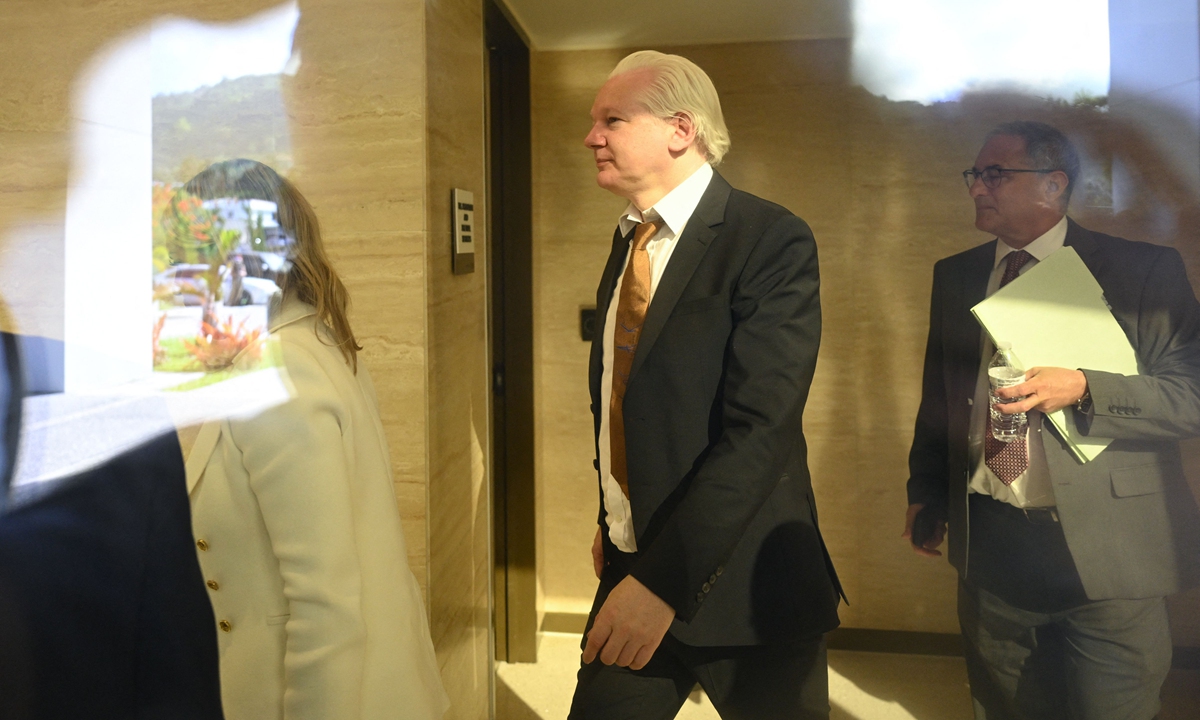
WikiLeaks founder Julian Assange walks through the US Federal Courthouse in the Commonwealth of the Northern Mariana Islands in Saipan, Northern Mariana Islands, on June 26, 2024 Photo:VCG
After a years-long legal battle surrounding the founder of WikiLeaks, Julian Assange, a dramatic turn has finally arrived. He has obtained long-awaited "freedom," though at the cost of pleading guilty to a felony charge related to his alleged role in orchestrating one of the largest-ever breaches of US classified military and diplomatic documents. On Thursday, he landed back home in Australia, as a free man for the first time in 12 years.
People who tell the truth have to confess in exchange for "freedom" - the fate of Assange demonstrates that the "free beacon" of the US has ultimately collapsed.
Founded in 2006, WikiLeaks exposed US military war crimes four years after its inception. Assange, the founder of the website, quickly became embroiled in lawsuits, with the US charging him with 18 counts, including violations of the Espionage Act. Arrested and imprisoned in the UK, Assange spent 1,901 days in a three-meter long, two-meter-wide cell, isolated from the world for 23 hours a day. Simultaneously, the US requested his extradition. The 52-year-old man now appears much older than his real age.
The US was determined to extradite Assange, ostensibly because he released what the US claimed was classified information related to national security and foreign affairs through WikiLeaks. However, in reality, it is a show to demonstrate that anyone who dares to challenge US hegemony and embarrass the US will be punished, Shen Yi, a professor at Fudan University, told the Global Times. By holding Assange accountable, the US government also hopes to set a strong precedent, demonstrating a zero-tolerance attitude toward leaking information that threatens its hegemonic status and reputation, and deterring other potential whistleblowers and leakers.
The seemingly sudden release of Assange can be seen as the most "dignified" choice for the US. The "plea deal" not only demonstrates the US' emphasis on the so-called national security, but also reduces the uncertainty of further legal battles, seemingly giving the US a "sense of victory," said Lü Xiang, a research fellow at the Chinese Academy of Social Sciences.
The US has displayed its double standard once again. Protecting human rights and freedom is something that US adversaries, not the US itself, should do. Speech that serves US interests, regardless of whether it is factual or logical, can get a free pass. But what the US does not like, especially the truths that would embarrass the US, are considered "guilty" or even a "crime." The narratives of freedom of speech swing with changes in US interests.
Although the US can force Assange to "plead guilty" through various means, the atrocities exposed by WikiLeaks cannot be erased. WikiLeaks exposed a large number of US diplomatic cables and military confidential documents during the Afghanistan and Iraq wars, revealing US war crimes. The video of the US military "Apache" helicopter shooting civilians in Iraq will continue to be remembered by people.
In order to cover up its crimes, laws can become tools of the US government. The chilling effect it hopes to achieve on "whistleblowers" not only brings personal harm to Assange but also deepens the world's profound doubts about the values that the US boasts.
A years-long international saga involving Assange may be over, but this history of injustice will always be remembered. Its impact will continue to resonate in the public and media spheres, reminding people of the US' trampling of freedom and human rights.




